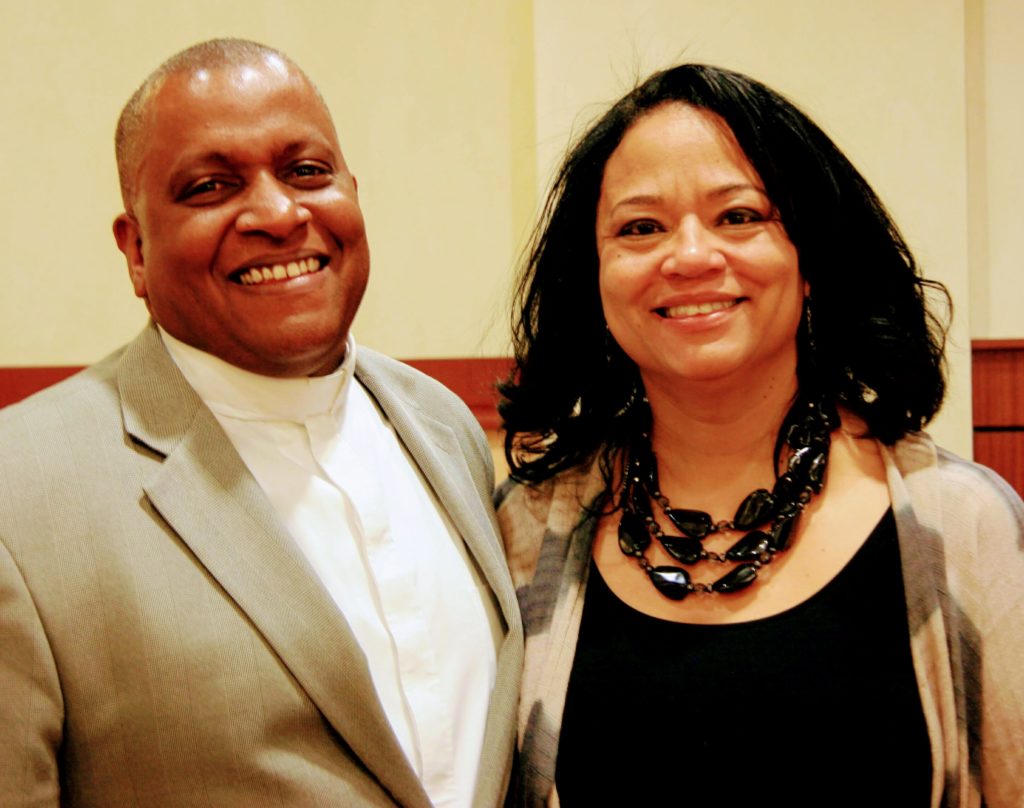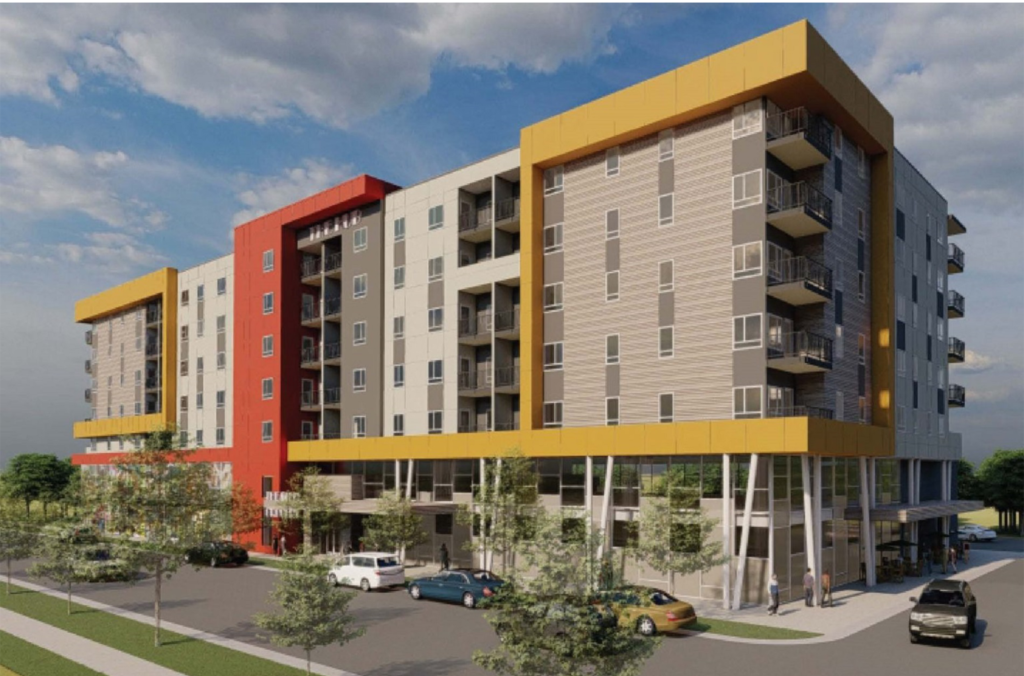We’re all familiar with the tale about the small seed that is planted and grows into the flourishing tree. Indeed it is an inspiring and miraculous process, whereby a tiny specimen breaks through the surface of dark soil to rise to the highest height possible with the aid of only a little water and sunlight. The thought of it so reminds me of the efforts in which I’ve engaged over the past eight years with community organizing and development in my Montbello neighborhood.
The journey has led us to shepherd the Montbello FreshLo Initiative, including the development of the Montbello FreshLo Hub, a multi-use facility that will offer 97 units of affordable housing (for individuals and families making between 40 and 70 percent AMI) as well as a performing arts theater, grocery store, and nonprofit service offices including Mental Health of Denver. I am grateful to The Denver Foundation for its role in this journey.
My Entree Into the Community
I moved to Denver in 2003 with my husband, Rev. James E. Fouther, Jr., and our two daughters, Danielle and Daryn, who were nine and six, respectively. We came to Colorado after eight years of living in South Florida. Bidding farewell to the oceanfront, we arrived at the beautiful mountainside city in response to James’s pastoral call from the United Church of Montbello, moving directly into the home (owned by the church) in the heart of Montbello. A variation of the Italian word, the community was named for the view of the beautiful mountains developers admired when building the neighborhood’s first homes in the mid-1960s.

My husband and I immediately saw similarities between Montbello and the neighborhoods we’d grown up in and around in our native home, Chicago, including proud community members, the majority of who owned and cared for their homes. That pride extended to Montbello High School and the youth who held the “Warrior” banner high. We sent our girls to the neighborhood school, Maxwell Elementary, named for Jessie Whaley Maxwell, the first African-American Administrator in Denver Public Schools who passed in 2002. Our church, which sits atop a hill, kitty-corner to the Montbello High School campus, was (and is still) composed of individuals and families from within the Montbello community and those from throughout Metro Denver. The first faith community in Montbello, it was created as a purposefully multicultural, multidenominational, and multigenerational church in 1968, shortly after the deaths of Dr. Martin Luther King and Robert Kennedy. In terms of community amenities, we also relished the neighborhood grocery stores — at the time two, Albertsons and Safeway.
A Community Turning Point
I believe Montbello began taking a turn in 2008, with the onset of the “Great Recession,” during which many families lost hold of their homes. For a time, you’d drive down any given block in the neighborhood and see at least three foreclosure signs. Indeed, the 80239 was listed by CNN as number nine on the list of “The Top 10 Zip Codes Hardest Hit by Foreclosure in America.” While the signs slowly disappeared and new neighbors moved in, we came to discover these neighbors now rented the homes from outside investors, many of whom took advantage of the downturn to buy foreclosures inexpensively. Additional changes included the closing of Montbello High School, which not only served as the primary DPS school for residents of the community, but a hub for sports, theatrical presentations, community meetings, and other gatherings. Additionally, both full-service grocery stores closed and were replaced by alternative models that met some of the community’s needs, but not all, as the previous stores did.
The Denver Foundation and the Planting of Seeds
I began working at The Denver Foundation shortly before the recession (from 2007 until the end of 2016) and often shared stories with colleagues of the trends I was witnessing and experiencing in my neighborhood. As disinvestment in Montbello was taking hold, bold and robust reinvestment was happening in many other Denver communities, compounding my realization of the stark disparities as I drove from Montbello through (then) Stapleton and into Cherry Creek and back each day.
In 2013, The Denver Foundation, along with LiveWell Colorado, hired long-time activist, educator, and community organizer, Rich Male, to gather a few Montbello residents and stakeholders to determine how the community might organize itself to begin addressing the issues we faced. I was a part of this small group, along with my husband, James, and long-time community residents and leaders Chris Martinez (current MOC president), Terry Liggins, Silke Hansen, and LaToya Petty. We quickly named our working group the Montbello Organizing Committee (MOC) and rolled up our sleeves, embarking on a journey of community awareness-building, listening, celebrating, and galvanizing.
The Journey of Community Organizing and Building
The journey has led MOC to become a 501-c-3 organization committed to community organizing and addressing issues such as transportation (including multi-modal), economic community development, mental health, education, leadership development, nonprofit capacity building, access to healthy food, and an overarching social justice and advocacy framework rooted in racial equity and amplified through our publication, the Montbello Urban Spectrum Edition (MUSE), a publication under the umbrella of the Denver Urban Spectrum.
Today, equitable community building is squarely at the center of our efforts, formalized by the MOC Board’s recent vote to become a community development corporation (CDC). We are fortunate to have Executive Director, Donna Garnett, who has led the growth of MOC to a new level, previously unimagined. Her efforts are augmented by 10 brilliant and diverse staff members, many of whom are Montbello residents.
Seeds Taking Root, Growing, and Flourishing
The Denver Foundation’s initiative and subsequent investments, through the Strengthening Neighborhoods Program and Community Grants Program, enabled MOC to leverage additional funding from many other foundations and sources. They include the Colorado Health Foundation, Caring for Denver, Mile High Connects, City of Denver, Rose Community Foundation, SPARCC, Gates Family Foundation, RootED, The Colorado Trust, Colorado Creative Industries, and others.
One of the most catalytic philanthropic investments has come from the Kresge Foundation. Through a referral and introduction from Dace West (at the time the Executive Director of Mile High Connects), MOC applied and was awarded a planning grant for a new FreshLo initiative of Kresge’s. We joined a cohort of 25 other organizations (out of 520 applicants nationwide) and began developing placemaking strategies that would marry health food options with cultural offerings in partnership with Montbello community members. The Montbello FreshLo Initiative resulted and now includes the development of the Montbello FreshLo Hub, a multi-use facility that will offer 97 units of affordable housing (for individuals and families making between 40 and 70 percent AMI). A cultural arts center, managed by Colorado Black Arts Movement (led by FreshLo Initiative Co-Chair Khadija Haynes), and Mental Health Center of Denver as well as additional nonprofit tenants. To date, MOC has received an allocation of Low Income Housing Tax Credits (LIHTC) for the affordable units and New Market Tax Credits, which will provide equity for the commercial and cultural spaces. Flo Development Services leads the project as the developer, and Montbello-based Gilmore Construction Corp. is a part of the general contractor team.
Matching grants from the Colorado Health Foundation have enabled us to enhance our development efforts with programming and infrastructure to promote sustainable healthy living. That includes the FreshLo Walkable Loop, the build-out of a six-mile walkable trail through Montbello’s residential area that links parks, schools, activated community gardens, and other features in the neighborhood. The intent is to improve health outcomes by adding safe walking trails, art installations, and access to freshly grown food. This work includes 26 community partners and has resulted in an allocation of City funds to install bike lanes, crosswalks, and lighting.
What’s Next

Our goal is to close on the Montbello FreshLo Hub development at the end of this year (2022) and break ground in early 2023, with a projected opening of early 2024. Through our collective efforts, we have secured $60 million of the $70 million required to complete the FreshLo Hub (read our project overview). We invite additional seeds of investment and generosity, assuring we will transform them into a flourishing garden that will benefit our entire community for years to come.
To learn more about MOC, the FreshLo Initiative, and ways to support, contact Donna Garnett at montbellofreshlo@gmail.com or Kate Lyda at kklyda@staroinsights.com. This project qualifies for Enterprise Zone Contributions with a 25% direct credit to Colorado State taxes. You can contribute to the MOC FreshLo through a donor-advised fund at The Denver Foundation. Contributions may also be made at www.montbelloorganizing.org. To give, click the donate button and select FreshLo Capital Campaign from the dropdown list.
Angelle C. Fouther is a Montbello Resident, Vice President of the Montbello Organizing Committee, and Co-Chair of the Montbello FreshLo Initiative.
